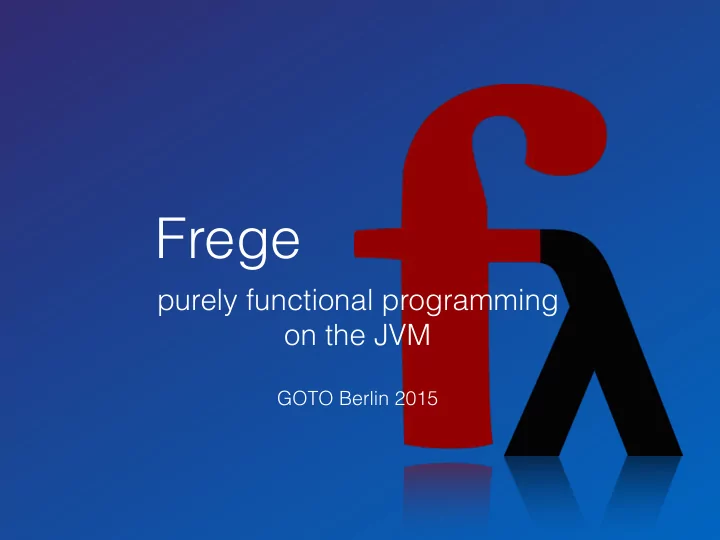

Frege purely functional programming on the JVM GOTO Berlin 2015
Dierk König canoo mittie
Dreaming of code
Why do we care? a = 1 1 1 2 2 b = 2 tj me 1 c = b 1 1 2 tj me 2 b = a 1 2 2 tj me 3 a = c 1 2 place 1 place 2 place 3
We need a debugger! Operational Reasoning a = 1 1 1 2 b = 2 tj me 1 c = b 1 2 2 tj me 2 b = a 1 1 2 tj me 3 a = c 2 1 2 place 1 place 2 place 3
Using functions a = 1 1 b = 2 1 2
Using functions a = 1 1 b = 2 1 2 2 1 swap(a,b) = (b,a)
Let’s just program without assignments or statements !
Pure Developer Functional Discipline Language
Online REPL try . frege-lang . org
Define a Function frege> times a b = a * b frege> times 2 3 6 frege> :type times Num α => α -> α -> α
Define a Function frege> times a b = a * b no types declared frege>(times 2)3 function appl. no comma 6 left associative frege> :type times Num α => α ->(α -> α) thumb: „two params of same numeric type typeclass only 1 return type is returning that type“ constraint parameter! a function!
Reference a Function frege> twotimes = times 2 frege> twotimes 3 6 frege> :t twotimes Int -> Int
Reference a Function No frege> twotimes x = times 2 x second arg! frege> twotimes 3 „Currying“, „schönfinkeling“, or „partial function 6 application“. Concept invented by frege> :t twotimes Gottlob Frege. inferred types Int -> Int are more specific
Function Composition frege> twotimes (threetimes 2) 12 frege> sixtimes = twotimes . threetimes frege> sixtimes 2 frege> :t sixtimes Int -> Int
Function Composition f(g(x)) frege> twotimes (threetimes 2) 12 frege> sixtimes = twotimes . threetimes frege> sixtimes 2 (f ° g) x frege> :t sixtimes Int -> Int
Pure Functions Java What could T foo(Pair<T,U> p) {…} possibly happen? Frege What could foo :: (α,β) -> α possibly happen?
Pure Functions Java Everything ! State changes, T foo(Pair<T,U> p) {…} file or db access, missile launch,… Frege foo :: (α,β) -> α a is returned
Pure Functions can be cached ( memoized ) can be evaluated lazily can be evaluated in advance can be evaluated concurrently can be eliminated in common subexpressions can be optimized
Let the type system find out! Is my method pure?
Java Interoperability Do not mix OO and FP , combine them !
Java -> Frege Frege compiles Haskell to Java source and byte code . Just call that . You can get help by using the : java command in the REPL .
Frege -> Java pure native encode java.net.URLEncoder.encode :: String -> String encode “Dierk König“ even Java can be pure native millis java.lang.System.currentTimeMillis :: () -> IO Long millis () millis () This is a key distinction between Frege and past = millis () - 1000 other JVM languages! Does not compile!
Frege allows calling Java but never unprotected ! is explicit about e fg ects just like Haskell
Type System Global type inference More safety and less work for the programmer You don’t need to specify any types at all! But sometimes you do anyway…
Keep the mess out! Mutable Pure Computation Mutable Pure Computation I/O Mutable Pure Computation
Keep the mess out! Mutable Pure Computation Thread - safe by Mutable design! Pure Computation I/O Checked by Mutable compiler Pure Computation Ok, these are Monads. Be brave. Think of them as contexts that the type system propagates and makes un-escapable.
Fizzbuzz http://c2.com/cgi/wiki?FizzBuzzTest https://dierk.gitbooks.io/fregegoodness/ chapter 8 „FizzBuzz“
Fizzbuzz Imperative public class FizzBuzz{ public static void main(String[] args){ for(int i= 1; i <= 100; i++){ if(i % 15 == 0{ System.out.println(„FizzBuzz"); }else if(i % 3 == 0){ System.out.println("Fizz"); }else if(i % 5 == 0){ System.out.println("Buzz"); }else{ System.out.println(i); } } } }
Fizzbuzz Logical fizzes = cycle ["", "", "fizz"] buzzes = cycle ["", "", "", "", "buzz"] pattern = zipWith (++) fizzes buzzes numbers = map show [1..] fizzbuzz = zipWith max pattern numbers main _ = for (take 100 fizzbuzz) println
Fizzbuzz Comparison Imperative Logical Conditionals 4 0 Operators 7 1 Nesting level 3 0 Sequencing sensitive transparent Maintainability - - - + Incremental development - +++
Unique in Frege Global type inference requires a purely functional language (only expressions and parametric polymorphism) Purity by default effects are explicit in the type system Laziness by default Values are always immutable Guarantees extend into Java calls
Why Frege Robustness under parallel execution Robustness under composition Robustness under increments Robustness under refactoring Enables local and equational reasoning Best way to learn FP
Why Frege it is just a pleasure to work with
How? http :// www . frege-lang . org @fregelang stackoverflow „frege“ tag edX FP 101 MOOC
Please give feedback! Dierk König canoo mittie
FGA Language level is Haskell Report 2010. Yes , performance is roughly ~ Java . Yes , the compiler is reasonably fast . Yes , we have an Eclipse Plugin . Yes , Maven / Gradle / etc . integration . Yes , we have HAMT ( aka HashMap ). Yes , we have QuickCheck (+ shrinking ) No , but STM is in the works .
Recommend
More recommend